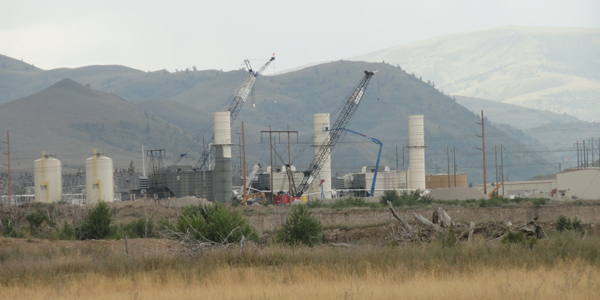By Tom Kleckner
The D.C. Circuit Court of Appeals on Friday upheld FERC’s determination that NorthWestern Energy’s proposal to recover the costs of a generating station providing regulation service was not just and reasonable.
The court rejected NorthWestern’s claim that FERC’s decision was “arbitrary and capricious” and violated the Administrative Procedure Act’s requirement that an agency’s decision be “reasonable and reasonably explained” (No. 16-117).
The Midwest utility had filed with FERC to revise its rates to recover the costs for its Dave Gates Generating Station, a gas-fired facility built in Montana to provide its own regulation service, after purchasing 60 MW annually of the service from other utilities became too expensive. The 150-MW plant went into service in 2011.
NorthWestern proposed to use Gates to supply 105 MW of regulation service to all its customers. Retail customers would pay for 45 MW at a state-approved rate, separate from Schedule 3 under NorthWestern’s Tariff with FERC. Retail and wholesale customers would pay for the remaining 60 MW under Schedule 3, which was calculated by multiplying the plant’s revenue requirement by 0.57 (the ratio of 60/105).
The utility also proposed to charge customers for fuel costs but credit them for any revenue the Gates plant might bring in from off-system sales and other nonregulation service sales; charge customers for the regulation service that it purchased during a 2012 outage; and charge customers for any regulation service that NorthWestern might need to purchase during future outages.
FERC affirmed an administrative law judge’s order reducing NorthWestern’s proposed rate by: (1) multiplying the revenue requirement by a different cost-calculation ratio of 0.13 (19/150); (2) excluding fuel costs from the Schedule 3 rate and rejecting the utility’s crediting arrangement; (3) requiring the utility to make a separate filing to recover costs associated with the 2012 outage; and (4) requiring it to make separate filings before charging customers for any regulation service that it might need to purchase during future outages.
The commission directed NorthWestern to refund its customers the difference between the proposed rate and the modified rate. It also denied a request for rehearing.
NorthWestern raised four challenges in arguing the case before the D.C. Circuit in December. It said FERC “unreasonably” reduced the numerator of its proposed cost-calculation ratio from 60 MW to 19 MW, but the court said the commission “reasonably modified” the calculation after determining that only 19 MW were needed to serve Schedule 3 customers.
The utility also contended that the commission arbitrarily increased the denominator of its proposed calculation from 105 MW to 150 MW. The court disagreed, noting that under FERC precedent, the denominator should reflect the nameplate capacity (150 MW), not just the megawatts that NorthWestern planned to devote to regulation service.
Third, NorthWestern argued that FERC inadequately explained its decision not to allow fuel costs and failed to account for the fact that the utility may be able to retroactively recover fuel costs. The court ruled otherwise.
Finally, the utility said the commission acted arbitrarily by requiring it to make separate Section 205 filings to recover costs associated with the 2012 outage and for any regulation service that it might need to purchase during future outages. FERC adopted the ALJ’s reasoning, which justified the separate proceedings on reasonable grounds, and “acted reasonably here as well,” the court ruled.
Writing for the court, Judge Brett Kavanaugh said he was not persuaded by NorthWestern’s challenge of FERC’s order for refunds. He noted that the commission “concluded that NorthWestern over-collected from its Schedule 3 customers, making this the kind of case in which FERC ordinarily orders refunds.”
“That determination was reasonable,” he said.






